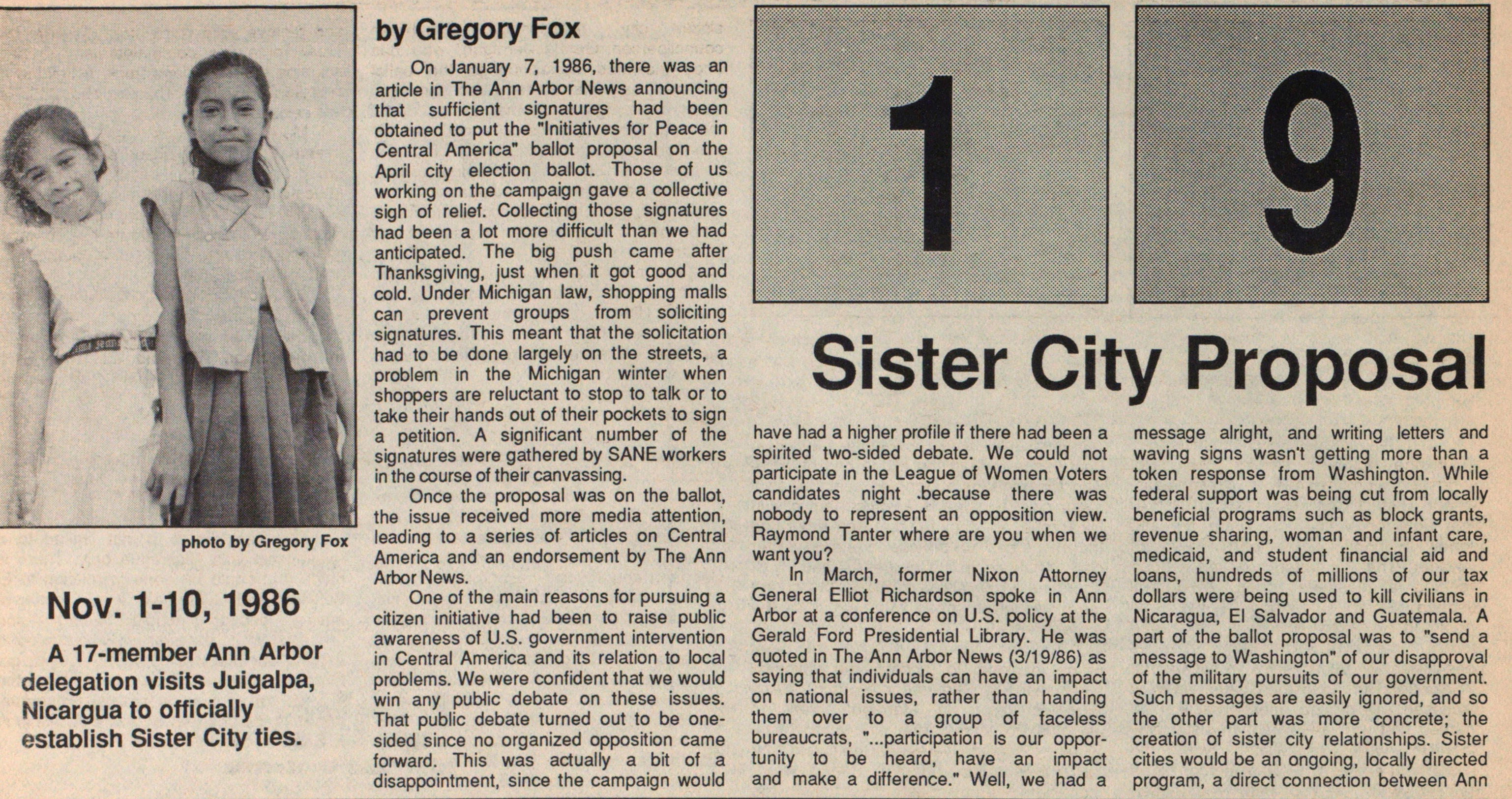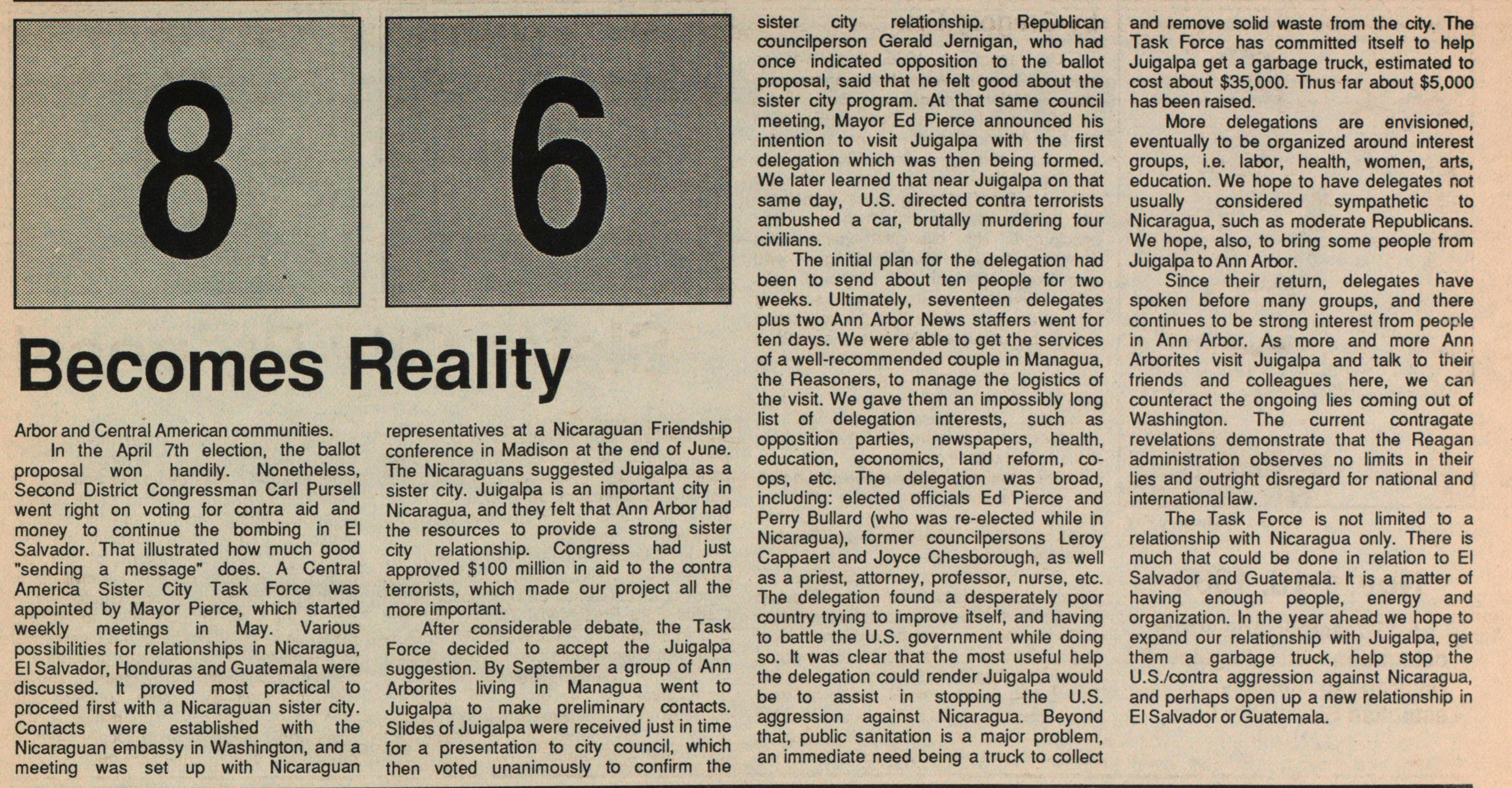Sister City Proposal


On January 7, 1986, there was an article in The Ann Arbor News announcing that sufficient signatures had been obtained to put the "Initiatives for Peace in Central America" ballot proposal on the April city election ballot. Those of us working on the campaign gave a collective sigh of relief. Collecting those signatures had been a lot more difficult than we had anticipated. The big push came after Thanksgiving, just when it got good and cold. Under Michigan law, shopping mails can prevent groups from soliciting signatures. This meant that the solicitation had to be done largely on the streets, a problem in the Michigan winter when shoppers are reluctant to stop to talk or to take their hands out of their pockets to sign a petition. A significant number of the signatures were gathered by SANE workers in the course of their canvassing.
Once the proposal was on the ballot, the issue received more media attention, leading to a series of articles on Central America and an endorsement by The Ann Arbor News.
One of the main reasons for pursuing a citizen initiative had been to raise public awareness of U.S. government intervention in Central America and its relation to local problems. We were confident that we would win any public debate on these issues. That public debate turned out to be one-sided since no organized opposition came forward. This was actually a bit of a disappointment, since the campaign would have had a higher profile if there had been a spirited two-sided debate. We could not particípate n the League of Women Voters candidates night because there was nobody to represent an opposition view. Raymond Tanter where are you when we want you?
In March, former Nixon Attorney General Elliot Richardson spoke in Ann Arbor at a conference on U.S. policy at the Gerald Ford Presidential Library. He was quoted in The Ann Arbor News (3/19/86) as saying that individuals can have an impact on national issues, rather than handing them over to a group of faceless bureaucrats, "...participation is our opportunity to be heard, have an impact and make a difference." Well, we had a message alright, and writing letters and waving signs wasn't getting more than a token response from Washington. While federal support was being cut from locally beneficial programs such as block grants, revenue sharing, woman and infant care, medicaid, and student financial aid and loans, hundreds of millions of our tax dollars were being used to kill civilians in Nicaragua, El Salvador and Guatemala. A part of the ballot proposal was to "send a message to Washington" of our disapproval of the military pursuits of our government. Such messages are easily ignored, and so the other part was more concrete; the creation of sister city relationships. Sister cities would be an ongoing, locally directed program, a direct connection between Ann Arbor and Central American communities.
In the April 7th election, the ballot proposal won handily. Nonetheless, Second District Congressman Carl Pursell went right on voting for contra aid and money to continue the bombing in El Salvador. That illustrated how much good "sending a message" does. A Central America Sister City Task Force was appointed by Mayor Pierce, which started weekly meetings in May. Various possibilities for relationships in Nicaragua, El Salvador, Honduras and Guatemala were discussed. It proved most practical to proceed first with a Nicaraguan sister city. Contacts were established with the Nicaraguan embassy in Washington, and a meeting was set up with Nicaraguan representatives at a Nicaraguan Friendship conference in Madison at the end of June. The Nicaraguans suggested Juigalpa as a sister city. Juigalpa is an important city in Nicaragua, and they felt that Ann Arbor had the resources to provide a strong sister city relationship. Congress had just approved $100 million in aid to the contra terrorists, which made our project all the more important.
After considerable debate, the Task Force decided to accept the Juigalpa suggestion. By September a group of Ann Arborites living in Managua went to Juigalpa to make preliminary contacts. Slides of Juigalpa were received just in time for a presentation to city council, which then voted unanimously to confirm the sister city relationship. Republican councilperson Gerald Jernigan, who had once indicated opposition to the ballot proposal, said that he felt good about the sister city program. At that same council meeting, Mayor Ed Pierce announced his intention to visit Juigalpa with the first delegation which was Ihen being formed. We later learned that near Juigalpa on that same day, U.S. directed contra terrorists ambushed a car, brutally murdering four civilians.
The initial plan for the delegation had been to send about ten people for two weeks. Ultimately, seventeen delegates plus two Ann Arbor News staffers went for ten days. We were able to get the services of a well-recommended couple in Managua, the Reasoners, to manage the logistics of the visit. We gave them an impossibly long list of delegation interests, such as opposition parties, newspapers, health, education, economics, land reform, co-ops, etc. The delegation was broad, including: elected officials Ed Pierce and Perry Bullard (who was re-elected while in Nicaragua), former councilpersons Leroy Cappaert and Joyce Chesborough, as well as a priest, attorney, professor, nurse, etc. The delegation found a desperately poor country trying to improve itself, and having to battle the U.S. government while doing so. It was clear that the most useful help the delegation could render Juigalpa would be to assist in stopping the U.S. aggression against Nicaragua. Beyond that, public sanitation is a major problem, an immediate need being a truck to collect and remove solid waste from the city. The Task Force has committed itself to help Juigalpa get a garbage truck, estimated to cost about $35,000. Thus far about $5,000 has been raised.
More delegations are envisioned, eventually to be organized around interest groups, i.e. labor, health, women, arts, education. We hope to have delegates not usually considered sympathetic to Nicaragua, such as moderate Republicans. We hope, also, to bring some people from Juigalpa to Ann Arbor. Since their return, delegates have spoken before many groups, and there continues to be strong interest from people in Ann Arbor. As more and more Ann Arborites visit Juigalpa and talk to their friends and colleagues here, we can counteract the ongoing lies coming out of Washington. The current contragate revelations demonstrate that the Reagan administration observes no limits in their lies and outright disregard for national and international law.
The Task Force is not limited to a relationship with Nicaragua only. There is much that could be done in relation to El Salvador and Guatemala. It is a matter of having enough people, energy and organization. In the year ahead we hope to expand our relationship with Juigalpa, get them a garbage truck, help stop the U.S.contra aggression against Nicaragua, and perhaps open up a new relationship in El Salvador or Guatemala.
Article
Subjects
Gregory Fox
Sister City
Old News
Agenda